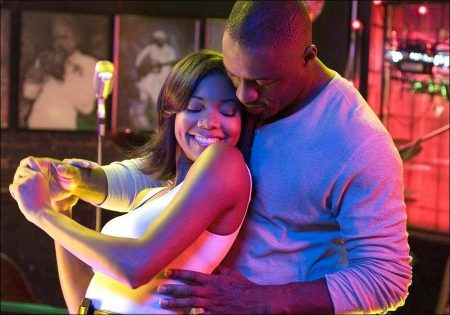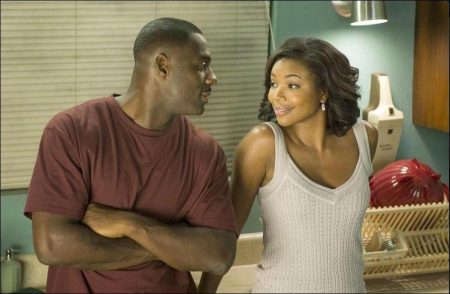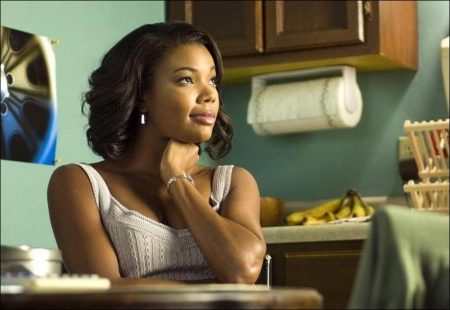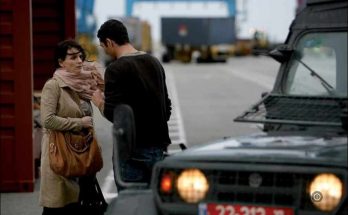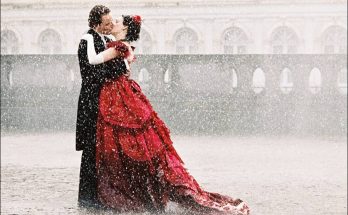Tagline: Give life. Teach love.
Daddy’s Little Girls movie storyline. The reverse-Cinderella tale centers on a successful attorney (Gabrielle Union) who falls in love with a financially challenged mechanic (Idris Elba) who is a single father of three children. The relationship hits a snag when the janitor’s ex-wife comes back into his life and threatens to take away their kids.
A single father, Monty (Idris Elba) is a garage mechanic who lives in a poor neighborhood and struggles to make ends meet as he raises his three young daughters on his own. But when the courts award custody of his daughters to his corrupt, drug-dealing ex-wife, Monty desperately tries to win them back, enlisting the help of Julia (Gabrielle Union), a beautiful – and hard-nosed – attorney he meets during his short stint as a chauffeur. While Monty and the Ivy-League-educated Julia couldn’t be less alike, an unexpected romance blossoms… and it soon begins to feel like true love. But in order for their relationship to survive, the couple must reconcile their two very different worlds – and overcome the forces that threaten to tear Monty’s family apart.
Daddy’s Little Girls is a 2007 American romantic comedy-drama film written and directed by Tyler Perry and produced by Perry and Reuben Cannon. It stars Gabrielle Union and Idris Elba. The film was released on February 14, 2007 by Lions Gate Entertainment. This is one of only three films directed by Perry that he does not appear in (the other two being For Colored Girls and Temptation: Confessions of a Marriage Counselor) as well as the first of Perry’s films to not be based on any of the filmmaker’s stage plays.
The film opened at #5 on Valentine’s Day 2007 behind Ghost Rider, Bridge to Terabithia, Norbit’s second weekend, and Music and Lyrics,[1] and has grossed $31,609,243 worldwide, making it Tyler Perry’s lowest-grossing film.
Atlantic Records released Music inspired by the film: Tyler Perry’s Daddy’s Little Girls, in stores and online on January 16, 2007. Among the highlights of the album is “Family First,” the first-ever recording by the Houston Family — Whitney Houston, Dionne Warwick, and Cissy Houston. The song “Can’t let You Go” by Anthony Hamilton is not on the soundtrack. Also, the song “Beautiful” by Meshell Ndegeocello is featured in the movie.
About the Production
With Tyler Perry’s Daddy’s Little Girls, his third feature and second outing as director, Tyler Perry delivers his most ambitious work to date. The film tackles the subject of fatherhood in black America via the story of Monty (Idris Elba), a garage mechanic fighting to regain custody of his three young daughters.
A man of limited financial means but unshakeable integrity, Monty takes on his malicious ex-wife and her violent, drug dealer boyfriend in order to secure the best future for the children he loves. Infusing the film with his characteristic blend of high drama, antic comedy, deep spirituality and rousing songs, Perry creates a heartfelt homage to fathers — and a welcome reminder that paternal commitment is alive and well in African- American communities.
Since making his feature debut as a writer, producer and actor in 2005’s Diary of A Mad Black Woman, Perry has maintained a breakneck creative pace. He wrote, directed, produced and starred in the follow-up to Diary, Madea’s family Reunion; toured and performed in over 300 stage shows across the country; wrote his first book, the #1 bestseller “Don’t Make a Black Woman Take Off Her Earrings: Madea’s Uninhibited Commentaries on Life and Love”; and created the syndicated television sitcom “House of Payne.”
For his third feature, Perry challenged himself to do something different. While his first two films were based on his plays, Daddy’s Little Girls was written directly for the screen. It is also the first of his films not to feature his popular characters Madea and Uncle Joe, whom he also portrays. Perry notes that this approach allowed him to delve deeply into his writing. “I just wanted to write and take my time,” he comments. “As a filmmaker, I’ve tried to tell stories that people can relate to. With Daddy’s Little Girls, I wanted to tell a story about a man who takes care of his children. It’s about the triumph of one man’s heart.”
In part, Daddy’s Little Girls is Perry’s answer to media’s largely negative portrayals of African-American men as fathers. He describes the character he created, Monty, as “just a regular guy who grew up and lives the ‘hood. Not unlike many black men, Monty didn’t know his father and he barely knew his mom. But with children and age, he decides to walk the straight and narrow so as to not fall into the stereotype but to be the best man that he can be.”
Perry’s producing partner Reuben Cannon believes viewers will welcome Perry’s fresh perspective. “Tyler Perry is so in touch with the hunger among audiences, especially black audiences, for stories other than the one’s we’ve seen,” the producer comments. “The story of a father who is devoted to his children, supports his children and has a dream for his children is something we rarely see. We’ve seen some African-American father / son relationships with Boyz N The Hood and to some degree in a movie I produced called Get on the Bus. But I can’t recall seeing a film about a father with his daughters in a long time.”
Daddy’s Little Girls is also about the search for love. It traces the romance that gradually develops between Monty and Julia (Gabrielle), a workaholic attorney whom he briefly chauffeurs and who subsequently represents him in his custody battle. Here, too, Perry drew inspiration from real life. “Julia is very loosely based on a friend of mine who is extremely successful but is having trouble finding a man,” the filmmaker explains. “I wrote about what I felt was universal for working women and men who are looking for love. Julia works very hard, is very successful, very proud and very strong. As fantastic as Julia’s professional life might be, she also wants love. But she’s having some issues finding a decent man because her standards are so high.”
Working-class Monty is an unlikely romantic prospect for the Ivy League-educated Julia and their relationship gets off to a rocky start. As a novice chauffeur, Monty makes some mistakes that aggravate his client, who demands, and is accustomed to receiving, seamless service. But their initial frostiness thaws as they get to know each other while working on Monty’s case.
“You have two African-Americans who fall in love in spite of their cultural and economic differences,” says Cannon. He notes that over the course of the film, the cultural divide as Julia rediscovers African American Atlanta. “Julia’s world and the world she deals with are very white and she really has removed herself from Atlanta’s African-American culture. It takes Monty to bring her back home, and then she falls back into it very easily.”
Community is another major theme in the film, which is set in Atlanta’s historic Auburn district, once the South’s most prosperous and entrepreneurial African-American community and the birthplace of Dr. Martin Luther King. Linking the neighborhood’s past to its present is Monty’s boss, garage owner Willie (Louis Gossett, Jr.). “Willie is the moral voice of the community,”
Perry comments. “He has been in the neighborhood for sixty-seven years, and he has seen it change. He remembers the 50s and 60s, when black people owned businesses along Auburn Avenue. Looking at the drug dealers who have come in and taken over makes him sad and disappointed.”
Among those drug dealers are Monty’s ex-wife Jennifer (Tasha Smith) and her ruthless boyfriend Joe (Gary Sturgis). When Monty and Willie decide to stand up to the criminal couple and their brethren, they are defending not only Monty’s children, but an entire community. And their neighbors ultimately take to the streets to reclaim what is theirs. “It takes one person to start the fight, and then if the rest of the community gets into it, it will be amazing,” Perry reasons. “I saw a television report about a woman who chased all the drug dealers out of her neighborhood and the entire community got behind her. I wanted to speak to what would happen if our community decided to take back not only our homes and our block, but our children, and drive out the bad elements from the neighborhood.”
Daddy’s Little Girls displays Perry signature affinity for mixing genres as its shifts between drama and comedy, romance and religion. It’s an approach that is rarely attempted in mainstream moviemaking, but one that Perry has finessed time and again, first in his phenomenally successful stage plays and then in Diary of A Mad Black Woman and Madea’s Family Reunion. Says Cannon, “Tyler breaks the rules. He’ll do a comedy/drama/romance and spiritual film all in one because that more closely resembles real life.”
Actress Gabrielle Union vividly recalls her first encounter with Perry’s work: watching Diary of A Mad Black Woman on an airplane. “I was just bawling, completely oblivious to everything around me. And the stewardess asks, ‘Ma’am, are you okay?’ And I go, ‘It’s just so sad!’ That’s when I knew I had to work with Tyler.”
Not long after, Union found herself on another flight, seated next to Perry’s agent, Charles King. “I said to him, ‘When can I work with your golden boy? I’d like to hitch my wagon to your rising star.’ Those were pretty much my exact words,” the actress reports. “About a month and a half later, I get a call from Charles: ‘Tyler’s written this script for you.’ I read it and said, ‘Let’s go.’ Tyler has a knack for finding the kinds of stories we see every day, but that Hollywood hasn’t exploited yet. He takes stories that we are all familiar with — as community members, as family members, as coworkers — and brings them to life. And he does it beautifully.”
Perry affirms that he has long admired Union’s work and the versatility she has shown in both comedies like Deliver Us From Eva and Bring It On and dramas like Something the Lord Make. He found it easy to imagine the actress playing the Ivy League graduate Julia. “I saw Gabrielle’s face and smile as I was writing,” he remembers. “Her sophistication and grace is something I knew everyone could relate to.”
Union thinks that Julia’s long romantic dry spell and comical blind dates will resonate with many working women. “Julia is a professional who hasn’t made a lot of time in her life for love,” Union says. “When you get to your 30s and you’re still single, the thing that comes up, especially among black women professionals, is ‘are you going to have to step outside of your comfort zone?’”
Monty, is certainly outside of Julia’s socioeconomic comfort zone. In casting this critical role, the filmmakers were seeking an actor with the magnetism of a romantic lead, who would also emanate a father’s nurturing warmth, dedication and strength. The search quickly led to Idris Elba, the British actor who won wide acclaim, not to mention an ardent female fanbase, when he portrayed Stringer Bell in the award-winning HBO series “The Wire.” Remarks producer Cannon, “Idris is an exciting actor and his craft is exceptional. I think a leading man must possess three things: physical appeal, a sense of danger and a sense of humor. Idris has all that, and charm in abundance.”
From their first filmed audition, it was clear that Union and Elba would make a potent onscreen couple. Upon viewing the tape, Perry recalls, “I had to ask, ‘Do they know each other??’ And Reuben says, ‘No, they just met that day.’ The chemistry was instant. It was amazing, electric.”
Daddy’s Little Girls is, ultimately, the story of a father’s love for his children. Elba, himself the father of a young daughter, responded strongly to the film’s depiction of a workingclass black father. “We are bombarded with images of black men that don’t look after their kids,” he comments. “But this movie turns that whole theory on its head. Monty has three girls who live with their mother’s mother. But he sees his kids, he raises his kids. When their grandma dies, Monty has to raise them himself. But something happens and the kids are sent back to their natural mother. I wanted to tell the story of this man’s struggle to get his children back. Monty has a lot of layers that we don’t often see in film characters, black or white.”
The ensemble cast of Daddy’s Little Girls reflects Perry’s flair for pairing newcomers with award-winning legends. Diary Of A Mad Black Woman featured Academy Award-nominee and Emmy winner Cicely Tyson in her first screen performance in 10 years; Tyson returned for Madea’s Family Reunion, and was joined by the revered author/actress/filmmaker Dr. Maya Angelou. Daddy’s Little Girls co-stars Academy Award-winner Louis Gossett, Jr. as garage owner Willie. “In every film I want to bring in some of the legends to work with the up-and-coming faces. I want to pay homage to where we came from and respect the actors that paved the way for the rest of us,” declares Perry. “It was an honor to have Lou Gossett on the set. He is a man of such class and grace, and he taught me so much just working with him.”
Gossett was impressed by the relationship Perry drew between Willie and his employee, Monty. Their deep bond reminds the actor of a father and son, and speaks to the film’s generational themes. “There’s something going on between the lines in their relationship, which I like a lot,” Gossett reflects. “It is symbolic of what people of my generation have to do in the ‘hood today, which is take personal responsibility for these younger generations so they can learn from that example and continue it.”
Actress Tasha Smith was cast as Monty’s ex-wife Jennifer, who exposes her daughters to her drug-dealing lifestyle with boyfriend Joe. Smith relished the opportunity to play a full-fledged villain, but was also careful to root Jennifer’s loathsome behavior in emotional reality. “Jennifer was in love with Monty, and I think it was one of those deep down, soulful kind of loves,” Smith comments. “But it didn’t work out, and resentment, anger, bitterness developed out of her hurt. So Jennifer is just going to make Monty’s life hell – he’s going to have to suffer as bad as she can make him suffer.”
A Method actor, Smith stayed in character at all times, including her sidebars with director Perry. “This was my first time ever working with a Method actor. I didn’t understand that they go into their character’s space and stay there,” Perry says. “I’m giving notes and Tasha’s being the character – the Baby Mama from Hell. And I’m thinking ‘what the hell?’ The first moment Jennifer shows up, you just hate her. Tasha did a great job.”
Jennifer’s boyfriend Joe is played by Perry’s boyhood friend, Gary Sturgis, who was also featured in Diary Of A Mad Black Woman. Producer Cannon praises the bravura nastiness Smith and Sturgis brought to their portrayals of the drug dealing couple. “They’re like Mr. and Mrs. Lucifer,” the producer chuckles. “Tasha may be playing the most wicked onscreen mother since Mommie Dearest, and Gary is every bit her equal.”
Monty’s daughters are portrayed by real-life sisters Sierra, China Anne and Lauryn McClain. Perry and Cannon got to know the McClain family while they were casting Perry’s television sitcom, “House of Payne.” “We were in the process of casting a little girl for that show and we were very fortunate to come across China McClain,” Perry recalls. “She was amazing. You could see that she really understood what was happening in a scene — you just had to watch her face. Then we found out that she had two sisters, Sierra and Lauryn, who were just as talented.”
Daddy’s Little Girls is the first feature film to shoot on the soundstages of Perry’s newlyconstructed Tyler Perry Studios (TPS) in Atlanta. “It was great for me to be in my own space,” Perry affirmed. The film also shot extensively in different locales in the city, including Auburn Avenue and the Georgia Aquarium. Perry’s connection to the city is deep; he came to Atlanta from New Orleans with absolutely nothing. “Atlanta for me was the Promised Land,” the filmmaker declares.
An emotional high point of the film arrives when Monty and Willie lead a grass-roots uprising to rid their neighborhood of drug dealers like Jennifer and Joe. The sequence was filmed in the Auburn district and local residents were asked to participate. “We had hundreds of extras right off Auburn Avenue, where the late Martin Luther King, Jr. raised his family,” notes Cannon. “It was very important that we make the community in which this scene takes place — the Wheat Street Baptist Church and the Wheat Street Housing Area — participants in their own portrayal.”
Several of Perry’s previous behind-the-camera collaborators joined him for Daddy’s Little Girls; in addition to Cannon, they include director of photography Toyomichi Kurita, who shot Madea’s Family Reunion, production designer Ina Mayhew and co-producer Roger Bobb, both of whom worked on Madea’s Family Reunion and Diary Of A Mad Black Woman. By all accounts, Perry’s set was welcoming, collaborative and orderly.
Comments Union, “You can’t ask for a better director. Tyler’s very actor-friendly, and he hires people that he feels are capable of creating. Everyone comes prepared, and it’s two takes and out.”
“Tyler Perry is a genius,” Elba enthuses. “He understands his audience like no one else. Writer/directors can be very sensitive about what actors do, but he gave us free rein. ‘Go ahead and make Monty your own,’ he told me.”
Perry knew he could rely on his cast to help him tell the story of Daddy’s Little Girls. “I trust Gabrielle and Idris. I trust Tasha and Gary and the McClains. And I revere Mr. Gossett.” Gossett returns the compliment. “Tyler knows exactly what he wants,” the actor comments. “He trusts his artists, his camera. It’s like a Clint Eastwood film: Clint sends a script to the production office and by the time he gets there, everything’s ready. Tyler has created a wonderful family, and I’m happy to have joined them.”
Daddy’s Little Girls (2007)
Directed by: Tyler Perry
Starring: Gabrielle Union, Idris Elba, Tasha Smith, Gary Sturgis, Tracee Ellis Ross, Lou Gossett, Jr., Malinda Williams, Juanita Jennings, LaVan Davis
Screenplay by: Tyler Perry
Production Design by: Ina Mayhew
Cinematography by: Toyomichi Kurita
Film Editing by: Maysie Hoy
Costume Design by: Keith G. Lewis
Set Decoration by: Rafael Garcia, Lance Totten
Music by: Brian McKnight
MPAA Rating: PG-13 for thematic material, drug and sexual content, violence, language.
Distributed by: Lionsgate Films
Release Date: February 14, 2007
Views: 74
